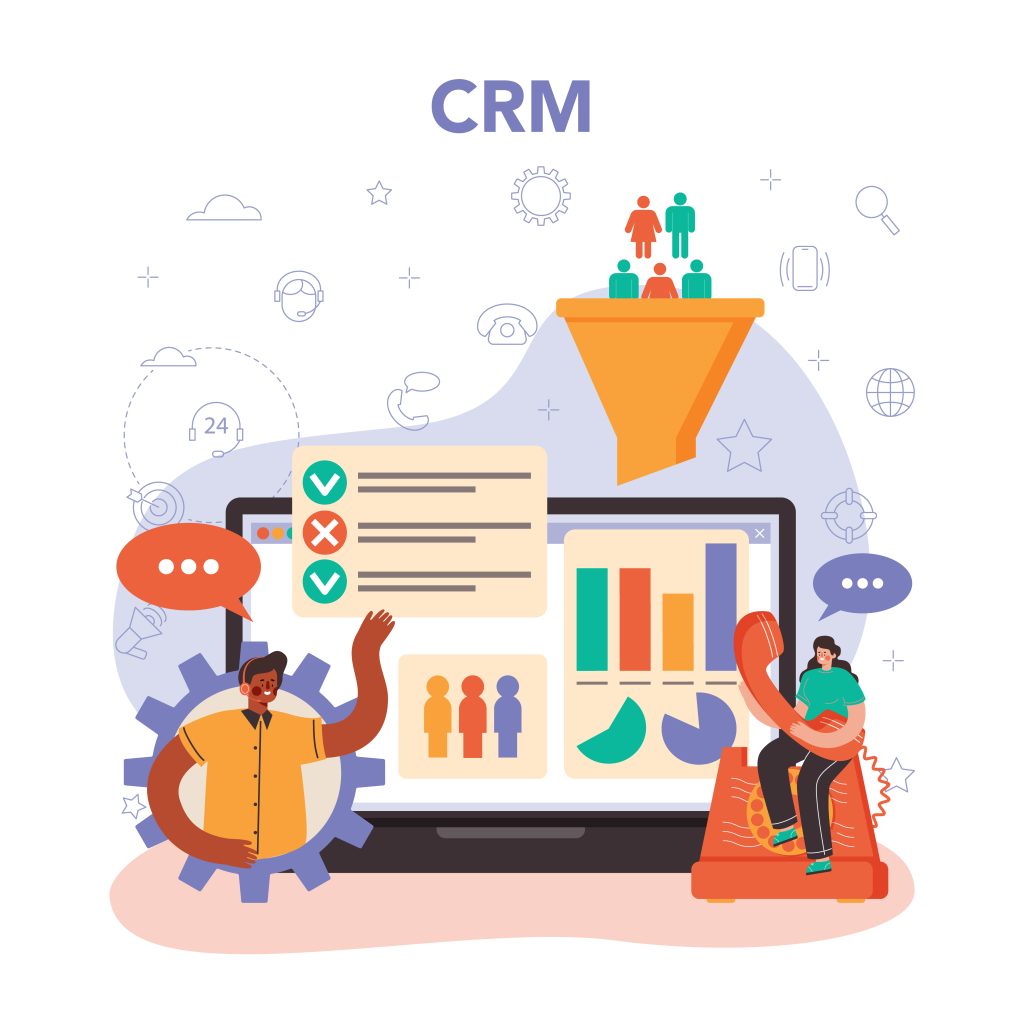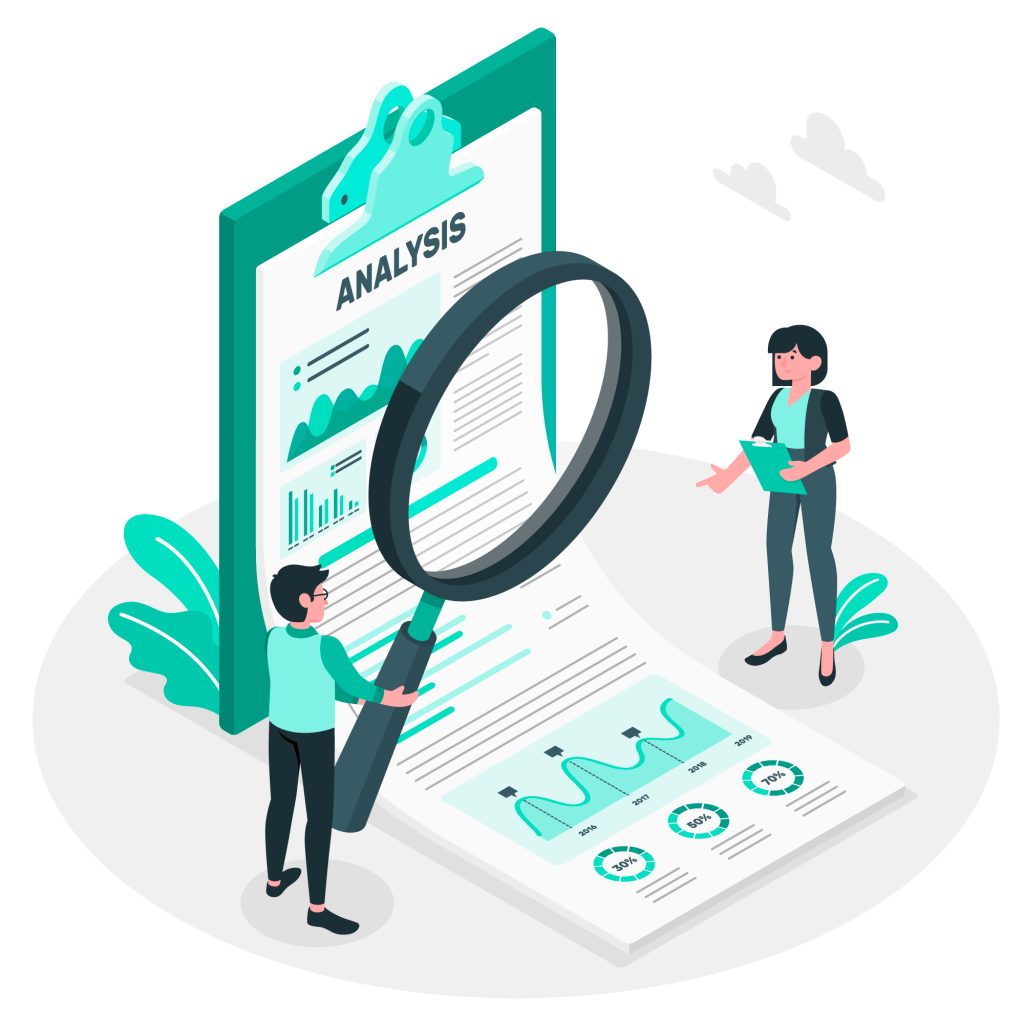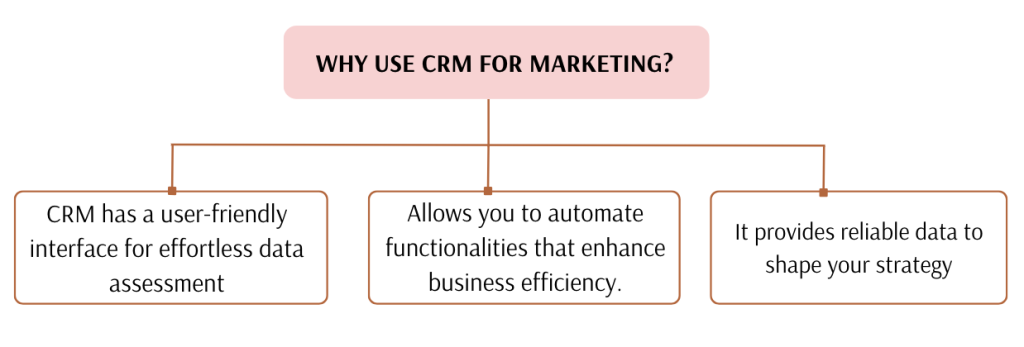What is CRM?
Customer Relationship Management (CRM) is a strategic approach and a suite of practices employed by businesses to effectively manage their interactions with existing and prospective customers. The primary objective of CRM is to elevate customer satisfaction, enhance retention rates, and foster loyalty by gaining a comprehensive understanding of individual customer requirements. At the core of CRM lies the utilization of sophisticated technology to gather, store, and analyze pertinent customer data, encompassing vital information such as contact details, purchase history, preferences, communication records, and other pertinent metrics. This invaluable data serves as a bedrock for businesses to derive valuable insights into customer behavior and preferences, enabling them to craft personalized approaches tailored to meet the unique needs of their clientele.
By leveraging CRM systems and methodologies, enterprises can cultivate stronger customer relationships, personalize interactions, and elevate overall customer experiences. Armed with a profound comprehension of customer preferences and behaviors, businesses can make informed, data-driven decisions, elevate customer service standards, and ultimately fortify customer satisfaction and loyalty.
Benefits of CRM

One of the primary advantages of CRM is the enhanced understanding it provides about customers. By consolidating and analyzing vast volumes of customer data, businesses can gain profound insights into individual preferences, behaviors, and needs. This comprehensive understanding empowers organizations to engage with customers on a more personalized level, delivering tailored experiences and solutions that resonate with their target audience.
CRM plays a significant role in improving customer satisfaction. With CRM systems in place, businesses can respond to customer inquiries and concerns more proactively and efficiently. Timely and attentive customer service not only addresses immediate issues but also builds trust and loyalty over time. As a result, customers are more likely to view the brand positively, leading to increased customer retention and enhanced brand advocacy.
The influence of CRM on customer retention and loyalty transcends mere service enhancements. Through personalized interactions and attentive care, businesses can cultivate lasting relationships with their clientele. By continually catering to the unique needs and preferences of customers, it fosters brand loyalty, ensuring that satisfied patrons remain committed to the company, reducing customer churn, and driving repeat business.

CRM systems provide valuable insights for sales and marketing teams. Armed with comprehensive customer data, businesses can devise targeted and effective campaigns. Sales representatives can better manage leads, prioritize prospects, and identify cross-selling and upselling opportunities. This data-driven approach leads to improved conversion rates, increased revenue, and optimized marketing efforts. In addition to its impact on external interactions, it also facilitates efficient internal operations. By centralizing customer data and streamlining communication across departments, CRM enhances interdepartmental collaboration and alignment. This unified approach ensures a consistent and seamless customer experience, regardless of the touchpoints, strengthening the brand’s reputation and fostering operational efficiency.
Businesses leverage CRM-generated analytics to make data-driven decisions, gaining valuable insights into customer behavior, market trends, and sales performance. These insights inform strategic choices, optimizing processes, adapting to market changes, and maintaining a competitive edge in a dynamic business landscape. In addition to enhancing customer service and operational efficiency, CRM offers workflow automation, streamlining tasks like email marketing, customer follow-ups, and appointment scheduling. This heightened efficiency saves time and enables employees to focus on more strategic and value-added activities, further boosting productivity. Given its multifaceted advantages, CRM proves indispensable for thriving in today’s customer-centric and highly competitive environment. By deepening customer understanding, improving satisfaction, enabling efficiency, and facilitating data-driven decision-making, businesses cultivate meaningful customer relationships, drive revenue growth, and secure a distinctive advantage in the market.
Types of CRM

CRM systems come in various types, each catering to specific organizational needs and customer engagement objectives. Below are the main types of CRM:
Operational CRM

Operational CRM is primarily focused on streamlining and optimizing day-to-day customer-facing processes within an organization, generating leads, converting them into contacts, capturing essential details, and providing comprehensive customer support throughout their lifecycle. It encompasses critical functions such as sales, marketing, and customer service. Operational CRM provides a suite of tools and features to manage leads, automate sales processes, track marketing campaigns, and efficiently handle customer inquiries and support tickets. It enables businesses to seamlessly manage interactions with customers throughout their lifecycle, from initial contact to post-sale support, ultimately leading to improved customer satisfaction and retention.
Sales Automation: This aspect automates the sales process, enabling organizations to acquire and manage both new and existing customers efficiently. It includes lead management, contact management, Quote-to-Order management, and sales forecasting.
Marketing Automation: Marketing automation seeks to determine the most effective methods for product offerings and reaching potential customers. Key components include campaign management, which helps businesses decide on the best channels (email, phone calls, in-person meetings, social media ads) to reach potential customers.
Service Automation: Service automation focuses on retaining customers by delivering high-quality service and building strong relationships. It encompasses issue management to resolve customer problems, customer call management to handle calls, and service label management to monitor service quality based on key performance indicators.
Analytical CRM

Analytical CRM is a data-driven approach to customer relationship management that focuses on analyzing vast amounts of customer data to derive valuable insights for making informed business decisions. This type of CRM leverages data mining, reporting, and data visualization techniques to identify patterns, trends, and customer behaviors. Analytical CRM helps organizations understand customer preferences, identify potential upselling or cross-selling opportunities, and evaluate the effectiveness of marketing efforts. By harnessing data analytics, businesses can refine their strategies, target their efforts more effectively, and ultimately enhance the customer experience. It’s a powerful tool for data-driven decision-making, enabling organizations to stay competitive in an increasingly data-centric business environment.
Key Features of Analytical CRM
- Aggregate customer data from diverse channels for structured analysis.
- Assist in establishing effective methodologies in Sales, Marketing, and Support to enhance customer relationships and loyalty.
- Enhance the effectiveness of the CRM system and analyze key performance indicators set by the business.
Collaborative CRM

Collaborative CRM is centered around fostering seamless communication and collaboration among different departments or teams within an organization. The primary goal is to ensure that all customer-related information is accessible and shared across various functions, including sales, marketing, and customer support. Collaborative CRM breaks down organizational silos and promotes a cohesive approach to customer interactions. It facilitates the sharing of customer data, preferences, and interaction history, enabling teams to work together efficiently to meet customer needs. This type of CRM ultimately enhances the overall customer experience by ensuring that customers receive consistent and coordinated support and communication from all touchpoints within the organization.
Strategic CRM

Strategic CRM places a strong emphasis on long-term relationship building and customer-centric strategies. It involves formulating and implementing initiatives to acquire, retain, and nurture valuable customer relationships over time. Strategic CRM aligns business goals with customer needs and expectations, fostering loyalty and brand advocacy. It may involve the development of loyalty programs, personalized marketing campaigns, and customer segmentation strategies. This type of CRM is focused on achieving sustainable competitive advantage by building deep and enduring connections with customers. By investing in customer relationships and delivering exceptional value, businesses can position themselves as trusted partners in the eyes of their customers.
Campaign Management CRM

Campaign Management CRM is a specialized CRM system designed to plan, execute, and analyze marketing campaigns effectively. It provides businesses with the tools and capabilities needed to develop targeted marketing initiatives that reach specific customer segments. This type of CRM enables organizations to track the performance of marketing efforts, measure campaign success, and refine future marketing strategies based on data-driven insights. It streamlines the entire campaign lifecycle, from planning and execution to analysis and optimization. Campaign Management CRM empowers businesses to maximize the impact of their marketing activities, ensuring that messages are delivered to the right audience at the right time, ultimately leading to increased conversion rates and improved return on investment.
Social CRM

Social CRM is designed to help businesses monitor and engage with customers across social media platforms effectively. It allows organizations to gather feedback, address concerns promptly, and participate in the social conversations surrounding their brand. Social CRM enables companies to build and maintain a positive brand image in the digital sphere by actively engaging with customers, responding to inquiries, and addressing issues in real time. It plays a crucial role in listening to customer sentiments, identifying trends, and leveraging social media as a channel for building stronger customer relationships. Social CRM is essential for staying attuned to the evolving landscape of customer interactions, helping organizations adapt and respond to changing customer preferences and behaviors in the dynamic realm of social media.

CRM Strategies

360-Degree Customer View
Developing a centralized database within your CRM system is the cornerstone of gaining a comprehensive understanding of your customers. This database consolidates a wealth of crucial information, ranging from contact details to purchase histories and interactions. This holistic view allows your team to delve into the nuances of customer preferences and behaviors. By having this wealth of information at their fingertips, your team can forge more meaningful and tailored interactions. Businesses can gain valuable insights by analyzing customer data, but the way they interpret this information varies. Some focus on customer relationships, while others examine transaction history or social media interactions. This diverse perspective, derived from a single data set, provides a range of analytical possibilities and numerous benefits. This 360-degree approach isn’t confined to customer data alone. It can also be applied to various aspects of a business, including accounts, assets, legal entities, locations, materials, and supply chains.
Personalization
Leveraging the data gathered by your CRM system opens the door to an elevated level of personalization in customer interactions. Addressing customers by their names is a simple yet powerful gesture that conveys a sense of recognition and importance. Beyond that, the ability to recommend products or services based on a customer’s past behavior and preferences adds a layer of convenience and relevance to their experience. This not only facilitates smoother transactions but also builds a deeper sense of trust and satisfaction. Additionally, personalizing marketing messages demonstrates that your company values its customers as individuals with distinct interests and needs. This personalized touch significantly increases the likelihood of engagement and conversion.
Segmentation
Dividing your customer base into distinct segments is a strategic move that enables you to fine-tune your messaging and offerings. By considering factors such as demographics, purchase behavior, and engagement levels, you can categorize customers into groups that share common characteristics or behaviors. This segmentation strategy allows for highly targeted communication that resonates with each segment. For instance, a tailored promotion for a specific demographic or a personalized email campaign for highly engaged customers can yield significantly higher conversion rates. The result is a more efficient and effective approach to customer engagement, as your efforts are focused precisely where they are most likely to yield results.
Lead Management
Implementing a structured lead management process is pivotal in ensuring that potential customers progress smoothly through the conversion journey. This involves meticulously tracking leads from their initial contact with your business to the point of conversion. Assigning leads to the most appropriate sales representatives based on factors like expertise or territory ensures that each lead receives the specialized attention it requires. Moreover, leveraging CRM data to prioritize leads with the highest potential optimizes resource allocation. This means that your sales team can focus their efforts on leads that are most likely to convert, ultimately driving higher conversion rates and maximizing the return on investment in sales efforts.
Customer Service Excellence
Effective customer service is a cornerstone of building strong and enduring relationships. Utilizing CRM to manage customer support interactions empowers your team to deliver exceptional service consistently. By tracking support tickets and monitoring response times, you ensure that no customer concern slips through the cracks. This timely and thorough approach to issue resolution significantly enhances customer satisfaction. It demonstrates that your company values its customers’ time and concerns, fostering a sense of trust and reliability. Providing this level of customer service excellence not only addresses immediate needs but also cultivates long-term loyalty and advocacy.
Social Media Integration
In an era where social media plays a pivotal role in shaping brand perception, integrating CRM with social platforms is essential. This integration allows you to monitor customer sentiments, engaging with them in real-time on these channels. Timely responses to inquiries or complaints on social media platforms demonstrate your company’s commitment to attentive customer service. By actively participating in social conversations, you not only address immediate concerns but also showcase a proactive and customer-centric approach. This can lead to increased brand loyalty and positive word-of-mouth, as satisfied customers share their positive experiences with their networks.
Continuous Improvement
Recognizing that CRM is an evolving tool is fundamental to its long-term effectiveness. Regularly reviewing CRM processes and strategies is crucial for staying aligned with changing customer needs and market trends. Seeking feedback from both employees and customers provides valuable insights into areas that may require adjustment or enhancement. This continuous improvement approach ensures that your CRM system remains a dynamic asset, capable of driving sustained growth and fostering enduring customer relationships. By adapting your approach as circumstances evolve, you position your business to not only meet but exceed customer expectations in a competitive and ever-changing marketplace.
Conclusion
In the dynamic world of business, maintaining meaningful connections with customers is not just a necessity; it’s a strategic advantage that can catapult your company to new heights. That’s where Customer Relationship Management (CRM) comes into play, acting as the compass that guides you through the ever-changing tides of customer expectations and demands. Imagine a world where customer interactions are seamless, where every touchpoint is tailored to their preferences, and where loyalty is earned through exceptional experiences. That’s the world CRM creates, a world where sales teams are empowered, marketing campaigns resonate with precision, and customer service becomes a memorable journey. But CRM is not a one-size-fits-all solution; it’s a versatile toolset that adapts to your unique business needs. With the right strategy and implementation, CRM becomes the backbone of your growth, breaking down silos and fostering collaboration across departments.
In this ever-evolving landscape of commerce, the true differentiator will be those who put the customer first. So, don’t wait another moment. Start your CRM voyage today and set sail towards a future where professionalism and engagement merge seamlessly, paving the way for an extraordinary customer-centric business that stands the test of time. Your customers are waiting; are you ready to embark on this transformative journey?
FUN FACTS ABOUT CRM!
- The concept of CRM dates back to the 1980s when “contact management” software was first introduced to help businesses manage their interactions with customers.
- Disney World in Orlando, Florida, uses a sophisticated CRM system to track visitor preferences and tailor personalized experiences. MagicBands, worn by guests, collect data on ride preferences, food choices, and more to enhance their overall visit.
- Celebrities often use CRM systems to manage their fan interactions, track fan demographics, and send personalized messages or updates.
- According to studies, implementing an effective CRM system can increase sales by up to 29%, customer retention by 27%, and sales productivity by 34%.
Revenue in the Customer Relationship Management Software market is projected to reach US$79.40bn in 2023.
Bon Voyage! Let’s begin your CRM journey with PanGrow today
All images belong to their respective owners. Please email [email protected] if removal is required.




